Kim and I have returned from nine days in Ecuador, where we laughed and learned — and played too much late-night Werewolf — with 24 other folks at the fourth annual chautauqua on money and happiness.
For those unfamiliar, every autumn a small group of like-minded people gathers in the Andes to talk about financial freedom and personal well-being. Sure, we spend time doing touristy things and enjoying the jungle, but mostly we sit around and share insights on how to be happy, wealthy, and wise. Although this might sound pretentious — Mr. Money Mustache calls it “crazy rich-person talk” — in practice it’s educational…and fun!
Each year, organizer Cheryl Reed invites three speakers to present their philosophies to the folks who’ve paid to attend the retreat. These speakers also meet one-on-one with as many attendees as possible, both formally and informally. And, of course, there’s tons of additional discussion outside the scheduled events. (In fact, it’s these free-form conversations at dinner and poolside that probably provide the most value.)
I’ve enjoyed that past chautauquas I’ve attended, but for my money this year was extra special. This was a great group of people that grew quite close by the end of the week.
I took detailed notes during the presentations from David Cain (who writes about becoming a better human at Raptitude) and Leo Babauta (who writes about mindfulness and minimalism at Zen Habits). Here’s what they had to say about being mindful and changing habits.
Quality of Mind is Quality of Life
In his talk, David Cain argued that it’s not only your circumstances that affect your well-being.
“The best way to improve your quality of life is to improve your quality of mind,” Cain said at the start of his presentation. “The less aware you are of feelings, thoughts, and the present moment, the lower your quality of mind and quality of life. You’re more stressed, you’re reactive, you’re uneasy, you’re paranoid, you’re needy, and you’re envious.”
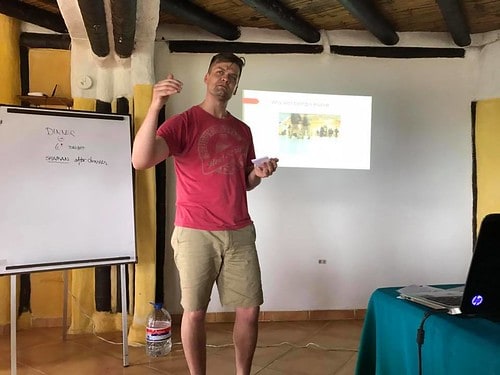
Well-being is elusive because we tend to be preoccupied with improving our circumstances, with chasing future satisfaction. We’re never satisfied with what we have now. We defer expectations of ease and peace to some time in the future. It’s like we’re on a treadmill of dissatisfaction.
One problem with goal-setting is that it promises some sort of fulfillment tomorrow instead of allowing us to focus on today. We believe if we meet our goals, we’ll be content. But we never are. There’s always something more that we want. (This is why I urge readers to draft a personal mission statement, to discern a purpose. A mission is like a compass, a guide to help you make decisions. It helps push you forward.)
Cain says that the fundamental human condition is a conundrum:
- We are seldom at ease in the present.
- We are always in the present. (Life only happens in present moments.)
So, how can we become more at ease? By training ourselves to be mindful to the experience we’re currently having. Mindfulness is awareness without judgment and criticism. Mindfulness is receptive, active, and accepting. The attitude of mindfulness is: “Can I be here for this too?”
We’re thinking most of the time, but we’re usually unaware that we’re thinking. Most of our thoughts are involuntary. Almost every time we notice something, the mind wants to comment on it. It wants to judge it. Most trains of thought are aimless or random or pointless. Our brain connects dots that don’t need to be connected. Yet all trains of thought insist that they are important. And these trains of thought will continue until they are interrupted.
Cain says that we can cultivate mindfulness through meditation and through a variety of conscious habits.
Although meditation often seems complicated, tricky, and intimidating, it’s actually quite simple. These are the three basic steps:
- Sit.
- Notice what it’s like to be sitting there.
- When you notice you’re no longer doing step two, do step two.
Most meditation practices are a bit more involved, but not much. Cain stress that you don’t need to quiet your mind in order to meditate. He says you will get lost in thought often — and that’s okay. Allow the mind to be as it is. Notice the next breath anyway. You might also feel bored, and that’s okay too. Boredom is a passing feeling. Restlessness is another well-known hindrance. But we don’t need to be 100% settled in order to meditate. Become aware of the sensation of the restlessness. Allow it to be present.
Sometimes people feel like they’re never going to get anywhere with their meditation practice. Don’t worry about how well you’re doing. It’s not a contest. Mindfulness gets much more stable over time. Becoming mindful at all, even for just a second, is progress.
Some things to remember if you decide to start meditating:
- It’s okay to not feel like you quite know what you’re doing. There’s no right way.
- Remember the point is to be in the moment.
- Thoughts are okay, just don’t engage with them. Let them arise and pass.
- The mind will wander. This is not a problem. You can’t stop it.
- Don’t worry about immediate rewards. It might take a while to see results.
- Don’t worry about “bad” sessions.
- Work with whatever feelings are present.
- Try guided meditations, but don’t use them exclusively.
- Remember that it gets much easier with practice and experience.
If meditation is a specific time of the day that we’ve set aside to practice mindfulness, mindful living is an attempt to put this philosophy into action. There are several ways to implement this.
Start with non-rushing. Slow down. Ask yourself, “Am I rushing right now?” If you are, then ask yourself, “Am I trying to be somewhere else before I can be?” Take your time and experience the present moment.
As an extension of non-rushing, practice stopping. Stop and let the world continue around you. Pretend that you’re gone. Pretend that you do not exist. Stop and watch the world without imposing your own story on it. “It’s a remarkable relief to pretend you’re dead for a moment,” says Cain. “It helps you not be attached.”
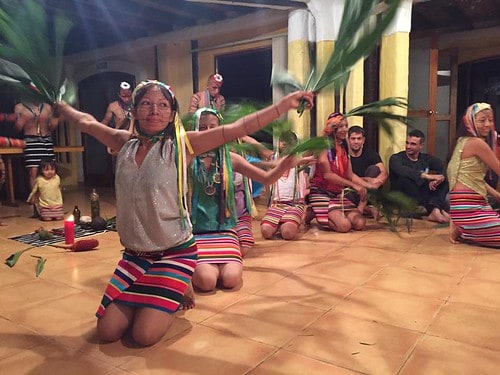
Also practice coming back to the body. Ground yourself by checking in with your physical state. This will help you disengage from the monkey mind. Try keeping some attention in your body while you walk, talk, and do things. Notice the physical aspect of your emotional reactions. When you get angry, what does that feel like? When you get nervous, what does that feel like? When you notice the physical side of a reaction, it helps to keep things in perspective.
Be mindful during very small tasks. Now and then throughout the day, when you’re about to do something that takes less than ten seconds — buttoning a shirt, starting your car, pouring a cup of tea — bring mindfulness to the whole duration of the act. Then go on with your day. Experience the action as if it’s the first time you’ve ever done it. What’s it like to pour a cup of tea? What’s it like to button a shirt? What do you notice about the experience?
Finally, Cain noted that mindfulness requires constant practice. You can’t just do it now and then. It’s a process of reworking deeply conditioned behaviors. Small but consistent practice works wonders; intermittent dabbling doesn’t.
By practicing mindfulness, we become more easygoing. We become less needy (to comfort, entertainment, and vice). We enjoy the ordinary, in-between moments in the day. Perhaps best of all, we find unpleasant moments much less troublesome.
There are two ways to experience something unpleasant.
- First, we can take the actual present-moment experience.
- Second, we can take what is given and add to it.
We almost never choose the first option. We choose to add wishes and blame and resentment and resistance and our personal narrative to the present-moment, and that’s what causes problems. Mindfulness can help us get closer to a pure, judgment-free experience.
Note: I think we can find a perfect example of this difference in interpreting events by looking at the results of yesterday’s U.S. Presidential election. Half of the United States is elated. Half of the country is despondent. In both cases, people are taking the actual event and adding to it.
Mindful Techniques for Changing Habits
During his presentation, my pal Leo Babauta spoke about using mindfulness to change our habits.
He started by exploring the stories we tell ourselves. “You all paid a lot of money and traveled a long way to get here,” he said. “You all have ideas about who I am and how I’ll act. For my part, I put a lot of pressure on myself. I want to live up to what I imagine your expectations to be. But these are simply stories we tell ourselves. They’re not real. We make them up in our heads. All that’s real is that I’m standing here and you’re sitting there and we’re in this room in Ecuador.”
Babauta says we allow our internal stories to direct our lives, even though they’re largely fabrications. To combat this tendency, we can learn to practice mindfulness. And we can use mindfulness to change our habits.
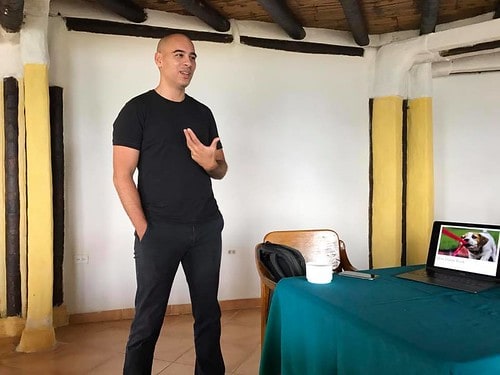
Much of our life is lived on autopilot, Babauta says.
When we get a new job, the first time we drive to work requires conscious effort. We have to think about the process. As time passes, the drive becomes less intentional and more reflexive. We’re able to make the drive without thinking about it. In fact, most of us have had the experience of having our mind wander while we drive to or from work. Our mind is elsewhere and suddenly we’ve arrived at our destination. A drive that used to require our attention has now become a habit.
A lot of our life is like this. We do things automatically, without intention. We act out of habit. If you want to change your life, you have to change your habits. And if you want to change a habit, you have to deliberately change your response to the queues that trigger it.
- If stress is a queue that triggers you to eat (as it has been for me in the past), then you need to consciously work to alter your response.
- If breaktime is a queue that triggers you to smoke, then you have to choose a different action. (When Babauta quit smoking, he practiced mindfulness. When the urge to smoke hit him, he’d observe it grow and crest and then subside. This mindfulness helped him become more aware, it helped him succeed.)
At a fundamental level, changing your story comes from practicing new habits. If you want to run a marathon, you accomplish that by adopting many small habits and practicing them on a regular basis.
Nobody knows how long it takes to change a habit. There’s a long-standing myth that it takes 21 days, but there’s no evidence that this is the case. Some habits can be adopted in less time. Teaching yourself to drink water takes 12 days. Teaching yourself to exercise regularly can take 80+ days. There are a number of factors: how easy the habit is, how consistent you are about practicing the new habit, how rewarding you find the new habit.
Babauta likes visual, physical reminders rather than alarms. You might, for example, put your running shoes next to the bed every night. Babauta used to put his meditation cushion next to the coffee maker. (I had a sign next to my desk in Savannah last winter: “Are you stuck? Go for a walk, motherfucker!”) These physical, visual reminders are powerful and effective.
If you have a negative response to a trigger, if you have “bad” habits — such as smoking or drinking or eating — your goal is to find a positive habit that you can use to replace the old, bad habit.
Why do we struggle with creating habits? Sometimes we forget. Sometimes life gets in the way. A lot of times we do well with adopting a new habit for a few days, but then something happens that interrupts the adoption process and we fall of the rails. Sometimes we put things off for little hits of pleasure (such as checking Facebook or watching a video).
When we allow ourselves to run to our distractions, we train ourselves to procrastinate. We allow resistance to win.
Note: This last observation was huge for me. I realized that I’ve been allowing myself to run to my distractions — Hearthstone, the puppy — too often, and that by doing so I’ve essentially trained myself to put things off. Yikes.
Resistance frequently comes when we pre-judge an experience, deciding in advance what we believe it’ll be like. Some people think fear causes resistance, but Babauta thinks the fear is the resistance. One attendee (Mary) said that she experiences resistance when she feels as if her choices aren’t her own, when somebody else is determining her future. Another attendee (Brittany) said negative self-talk causes her resistance: “Sometimes the little hater in my head gets going and just won’t stop.”
Babauta says that uncertainty is at the root of all our fears, at the root of our resistance: uncertainty about the future, about the outcomes, about our abilities. The human mind does not like uncertainty. Uncertainty feels like a lack of control.
There are a couple of ways to cope with resistance, to cope with fear.
- Use some sort of external mechanism. Ask others to hold you accountable. Impose a deadline (with consequences).
- Embrace the resistance. Be curious about the barrier and explore it. What does the resistance feel like? What happens if you don’t succumb to it?
Rather than live our lives on autopilot, Babauta wants us to “see the story” as we tell it to ourselves, to be aware of it. Our mind is always telling a story about what’s happening, but that story is our subjective projection of objective experiences. It’s not reality. It’s merely our personal perception of reality, and that differs from the perception of others.
We all have stories about our immediate experiences, stories about our pasts, and stories about the people around us. (It’s these stories about others that cause us to judge them.) These stories determine our behaviors and attitudes. Our stories affect our moods. They give us our sense of self.
If your story is helpful, great; there’s no need to change it. But sometimes our stories cause us stress and anxiety. Sometimes our stories are true, but often they mislead us. The stories we tell ourselves create resistance. If you want to change your habits, you have to change your story.
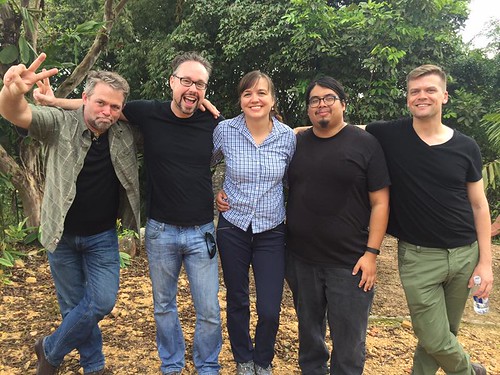
If you want to change your story, the first step is to become aware of the story. One way to do that is to force yourself to pause at regular intervals to ask yourself how you’re feeling. Notice the story you’re telling yourself and how it makes you feel. Observe it. Try to view it as if you were an impartial third-party observer. Pretend you’re watching your life from a higher perspective (as if you were a passenger in an airplane perhaps).
When we give into resistance, when we procrastinate, we’re neglecting our selves. We’re not treating our selves as a friend. When you hang out with a friend, you don’t get distracted by email, you don’t watch Big Bang Theory — you pay attention and interact with the friend. Babauta says we ought treat ourselves the same way. Instead of retreating when we feel resistance, instead of distracting ourselves, we need to give ourselves unconditional positive regard. We need to love ourselves as much as we love our friends. (This echoes the advice of M. Scott Peck in The Road Less Traveled.)
If you go “all in” when trying to change a habit, when you try to change your story, you’ll be more effective. Don’t be half-hearted. If you want to make a change, then give everything you have to make that change happen. Know your motivation. The stronger the motivation, the more likely you are to stick to the habit. And when your motivation has love as its root, it’s stronger yet.
If you can make the act itself the reward, you’ll be more likely to do it. If running is a reward, for instance, you’ll want to run. One way to do this is to be grateful for the action. Be grateful to be able to run. Be grateful that you have so much stuff that you have to declutter. Be grateful that you’ve had so much to eat that you’re overweight and eating less is a choice rather than a necessity.
Note: Based in part on his experience in Ecuador, Leo recently wrote about the way to find a powerful human connection.
How to Be Rich and Happy
I gave the final presentation of the week, during which I explained my vision of how to be rich and happy. Obviously, I couldn’t take notes during my own talk, but that’s okay. We’ve covered most of this material several times at Money Boss. Nevertheless, here’s a very quick summary.
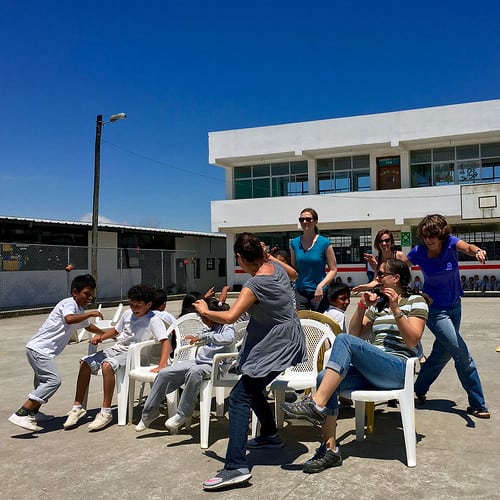
A lot of people think that money will make them happy. They’re not completely wrong. Wealthier countries do tend to be happier than poorer countries, and wealthier people do tend to be happier than poorer people. But money has diminishing returns when it comes to happiness. To the extent that it builds a better life, it can increase well-being. Once a person has obtained the basics, though, and acquired a handful of luxuries, adding more money to the equation has little effect.
Research has shown that about half of our happiness comes from a genetic setpoint. About 10% comes from life circumstances that are difficult or impossible to change. (You can’t change your age or your eye color. It’s tough to change where you live and how you look.) However, there is about 40% of your happiness you can control, and that comes from intentional activity, such as your thoughts, actions, and attitudes.
If you want to increase your sense of well-being, these actions have proven to be most effective:
- Make physical exercise a regular habit.
- Nurture relationships with family and friends.
- Express gratitude for all you have.
- Offer help to those who need it.
- Savor life’s pleasures and live in the moment.
- Practice optimism when planning your future.
- Commit to lifelong goals and ambitions.
- Choose poise and resilience in the face of challenge.
That last tip is important. A lot of folks allow their moods and attitudes to be determined by the world around them. Their happiness is largely controlled by outside forces. That’s too bad.
In his seminal work, Flow: The Psychology of Optimal Experience, Mihaly Csikszentmihalyi writes:
[Happiness] is not the result of good fortune or random chance. It is not something that money can buy or power command. It does not depend on outside events, but, rather, on how we interpret them. Happiness, in fact, is a condition that must be prepared for, cultivated, and defended privately by each person. People who learn to control their inner experience will be able to determine the quality of their lives, which is as close as any of us can come to being happy.
If you want to be happier, deliberately choose the way you filter your experiences. Opt to give them a positive spin. Opt to respond as pleasantly as possible to outside events. If a driver cuts you off in traffic, for instance, you get to choose how to respond. If you choose to get angry, you decrease the quality of life for both yourself and others. If you don’t like who gets elected President, you get to choose how to respond. You get to choose your mood and your actions going forward.
Another way to boost happiness is to increase the variety of your experience. Say “yes” to more opportunities. Say “yes” to the things that scare you. Say “yes” to meeting new people. When you say yes to new people and new experiences, it’s like you’re playing the lotter of life. Most of the time, taking these small risks won’t pay off in any meaningful way. But occasionally you’ll hit the jackpot.
I believe strongly that the best thing you can do to improve your life — financially and otherwise — is to become clear on your purpose. Spend some time to think about what it is you want to accomplish in life. What gives you meaning? Use this information to guide your decisions, with money and everything else.
Once you know your purpose, you can manage your money to support it. In nearly every instance, that means treating your personal finances as if you were running a small business. You must be your own Chief Financial Officer. I want you to think of yourself as the CFO of You, Inc.

To survive, a business must make a profit. Without a profit, a company cannot pursue its mission statement. The same applies in your personal life. If you aren’t earning a profit — if you’re not earning more than you spend — it’s impossible for you to follow your dreams.
To earn a profit, you must spend less than you earn. That’s the definition of profit, actually. And the best way to boost the gap between earning and spending is to focus on the big stuff. Don’t get distracted by small things like clipping coupons. Instead, cut your housing costs, trim your transportation spending, and — most of all — look for ways to earn extra income.
I believe most people are best served if they aim to save half their income. This might not be possible at first, and I know it, but if you choose to focus on tomorrow instead of today, you can create a large profit. And with this money, you can achieve early retirement, or put your kids through college, or travel the world, or create a charitable foundation. Profit gives you the power and freedom to choose actions that are truly aligned with your purpose and values.
Note: My presentation was built on the core material from this site. To get the full version, first read about how to build confidence and destroy fear. Follow that with how to be happy and lead a meaningful life. Finish by reading my Money Boss manifesto.
Final Thoughts
It’s amazing that I’ve spent 4000 words summarizing the core information from last week’s three presenters. This post glosses over so much! And as I said earlier, these presentations are a mere fraction of the knowledge and experience all 26 of us shared during the course of the week.
For me, the best part of the Ecuador trip is always my one-on-one meetings with attendees. It’s interesting to get to know these people, to hear their experiences, and to learn what makes them tick. It’s one thing to talk about happiness and mindfulness and financial freedom on a blog, but another to see practical application in real life. It’s never as straightforward as it might seem.
It’s also an interesting contrast to be sharing this crazy rich-person talk in a country that’s so poor. What are the implications there? Are we doing good by bringing money into the economy? Are we arrogant and self-centered to talk about mindfulness and habits and mission statements in a country where so many folks are simply struggling to survive? I don’t have good answers to these questions, but I think about them each time I visit.
Ultimately, however, I believe this annual chautauqua is a net good for everyone involved. I plan to participate whenever my schedule allows. And I hope one day to see you in South America for a discussion about money and mindfulness.
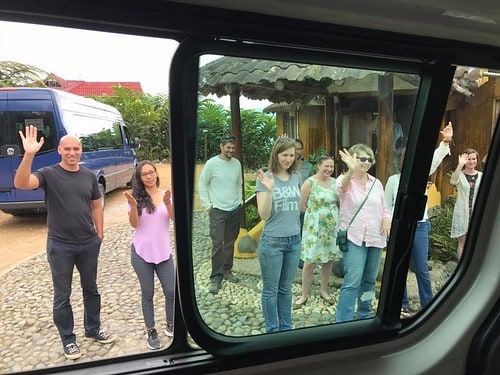
Note: Photos by Ryan Smith, Mary Woods, and J.D. Roth

Mindfulness makes me think of having kids. When you teach a childay to fasten a button you slow down and think about it as you say. I think this is part of the joy of children. In that moment you HAVE to slow down. And you then have the privilege of the sharing their joy when they do it themselves. And when you’re conscious of it you’re thankful that it is easy for you.
A second thought, your comment about mindfulness and changing habits made me think of Lent. When you give up something for Lent you are supposed to be mindful and each time you miss it or are aware of the loss it makes you think of God and pass on a prayer. What you describex is a non-religious version of that.
I spied a shot of Mr. 1500s dinosaurs hanging out at the equator. Didn’t appear to be practicing mindfulness.
The Chautauqua sounds like a great gathering, and we’ve been talking about spending some extended time in a Spanish speaking country. Perhaps we’ll return to Ecuador one of these years.
Cheers!
-PoF
Ah mindfulness. I’ve read and re-read Rinpoche’s ‘The Joy of Living’, and I have been trying to work both mindfulness and meditation into my life. I still find it surprising that such a simple idea should be quite this hard to actually practice. Why Rinpoche’s book? Mostly because I visited a few Buddhist monasteries in Ladakh when I was a child and I always remember how happy all the monks seemed. I felt that they were privy to some secret and when I first came upon his book I leapt at the chance to discover what the secret was.
Sounds like a great trip, I appreciate the recap! I think these are all good lessons and I know I can be better about practicing mindfulness. This morning I got half-way to work when I realized I left something at home. I was pretty upset with myself and the drive in was much less enjoyable. I think that would have been a good opportunity to reflect on the moment to calm myself. In the end, it wasn’t that big of a deal and not something worth getting worked up over. Thanks for the post!
The Chautauqua looks amazing as always. I’d love to go back! Looks like you had a great time and learned a lot!
Werewolf is on the list for our next games night later in the month. Not played yet (not one I own) but looks fun. Fury of Dracula is the other (kind of a carry over from a halloween themed evening, we were to ambitious with what we wanted to play). I love absorbing myself in games and learning about the way people think. Sorry, I get distracted when anyone mentions games!
I like your point about maintaining poise and resilience in the face of challenge being one of the keys to keeping an “internal locus of control” where you train yourself to see yourself in control of your life (as opposed to life happening to you). I was reading a great book last week called “Grit” where the author talked about how those that kept going when the going got tough were overall more successful and happier than those who didn’t. It’s a good point to remember in our everyday lives, especially when we’re tempted to let our lives run on autopilot and have things happen to us.
I was fortunate enough to attend the first chatuaqua and can’t recommend the experience highly enough. Three years on my life is still enriched from the lessons I learned there. If you have the means then do yourself a favor and go. J.D. in person is exactly as you’d expect him to be: gracious, interesting, and fun to be around.
It is bittersweet to hear about your Chautauqua trip and see the pictures! I went last year and had an amazing experience. I hope to make it back someday. One of my secret goals is to be one of the speakers. Just need a few more years and a unique success story! (working on it!) Thanks for sharing!